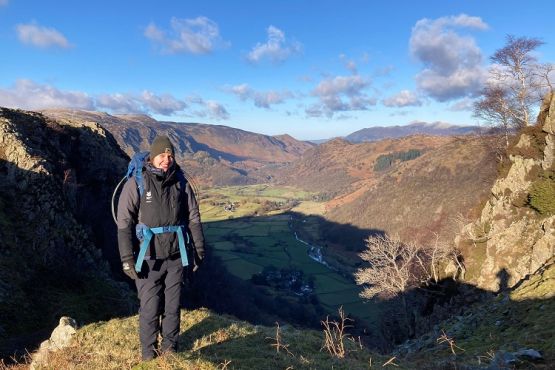Elysia : Assistant Ranger apprentice on Level 2 Countryside Worker apprenticeship

In her final year of university, Elysia realised she wanted to pursue a role in conservation and she could benefit from an apprenticeship, with it’s practical skills and hands on learning.
Why did you first choose to apply for an apprenticeship?
In my final year of university (on an unrelated course) I developed an interest in conservation. After graduation I started looking for ways to get into this career, initially thinking I would need to go down the route of doing a master’s degree. While researching, I saw this apprenticeship advertised and thought it was ideal; I would get a qualification in a conservation related role, as well as gaining invaluable hands-on experience sought after by employers.
Best thing about the apprenticeship?
The variety. Every day is different, and I am constantly learning. I feel lucky to have such a friendly and supportive team too, they are always teaching me new skills, techniques, and knowledge.
Any challenges?
One of the things I found hardest was learning some of the physical skills. For example, I hadn’t really had to use a hammer before starting this role, and suddenly I needed to use one for most of the day! I found it frustrating at first, but I was determined to improve and now it’s one of my favourite tasks. My new challenge is ambidextrous hammering!
Have you done anything that you didn't expect whilst on your apprenticeship?
Yes, lots! On my second day in the role I was on a boat carrying out invasive species surveys. I’ve helped with traffic management, been on a team trip to the Cairngorms, repaired potholes, and operated a post-knocker attachment on a digger, just to name a few. I even ended up having lunch by torchlight in a cave one day to escape the reliable Lake District rain.
How has the training provider/college supported you?
The college is always easy to contact and happy to answer any queries I might have. The lecturers have industry experience so they often use real life examples in their teaching, making the subject more relatable.
What are your plans for the future?
Once I finish my apprenticeship I hope to take on an assistant ranger role within the National Trust. Longer term, I would aim to progress to a ranger role, and ultimately undertake the Level 4 Countryside Ranger qualification. I also have a keen interest in native rare breeds conservation, so I’d like to undertake some work related to that.
Any advice for anyone thinking of doing an apprenticeship?
Apply if you have a genuine interest, even if you think your chances of being successful are low. And if you are successful, say yes to every opportunity that comes your way!
Categories
- Apprenticeships (52)
- Building Surveying (3)
- Business Services (1)
- Catering (1)
- Communications and Marketing (3)
- Conservation (9)
- Countryside (10)
- Curatorship (3)
- Diversity (1)
- Estate Management (4)
- Finance (2)
- Food and Beverage (6)
- Fundraising (8)
- Gardening (11)
- General Management (2)
- Governance (2)
- Heritage Building Crafts (4)
- Holidays (3)
- House and Collections (4)
- IT (8)
- Membership (1)
- People and Legal (3)
- Projects and Programmes (6)
- Retail (2)
- This is us (5)
- Visitor Experience (3)
- Volunteer and Community (3)
- Volunteering (1)
- Work Experience (1)
- Young People (12)

